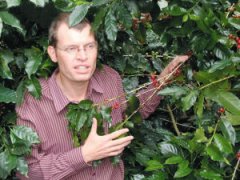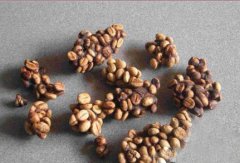Pu 'er Kannong has been planted into "Hua Million" in 15 years

On the afternoon of the 26th, Hua Honglin arrived in a white POLO in the Muni River area of Pu'er Industrial Park, which was in full swing. The 42-year-old man was strong and well-built, dressed in Adidas costumes. As the first farmer to grow coffee in Pu'er area and the secretary of the party committee of Dakaihe Village in Pu'er, he has been interviewed by no less than 100 media, and the farthest reporter is from Europe.
"people outside say that you have a nickname 'Hua million', which is grown from coffee." After listening to the reporter's words, Hua Honglin, who talked and laughed freely, was suddenly embarrassed. 'it 's all nonsense from outsiders,'he said.
15 years ago.
"apart from taking the lead in growing coffee, I also have to do the ideological work of the masses."
Hua Honglin emigrated to Dakaihe Village in 1995. At that time, he wanted to grow 30 mu of contracted coffee land, which could be used as the fifth branch secretary of the village. in addition to taking the lead in growing coffee, he should also make the villagers rich.
Hua Honglin recalled that because he had been exposed to coffee in his early years and knew Nestle, he was relatively rich in market information, so he was optimistic about the prospect of growing coffee, but the villagers did not trust this thing that could not fill their stomachs. "there are individual villagers, our party group is lobbying in his house every day, and even every household buys food supplies, but some villagers would rather sell the grain and use it to eat meat."
Persuading villagers to grow coffee is only the first difficulty. The soil and climate of Dakaihe Village are rare coffee growing conditions, and large foreign companies such as Nestl é are the first purchasers. After a year of hard work, by 1999, the coffee in Dakaihe Village has reached the goal of two mu per capita. However, when the seeds of hope had just sprouted, something unexpected happened. As soon as the newly planted coffee grew green leaves, it suffered the worst frost in a century, which killed most of the coffee seedlings. This is tantamount to pouring cold water on the enthusiasm of the newly aroused villagers. "it was too difficult to ask the villagers to grow coffee later. In addition to growing a lot of coffee to drive the masses, I also have to do the ideological work of the masses and go to the villagers' homes to 'get even' for them. "
According to Hua Honglin, the account is calculated like this: coffee produces 200 kilograms of coffee rice per mu every year (finished products). In 1995, the selling price of coffee rice was 36 yuan per kilogram, and in 1998, the selling price of coffee rice was 9 yuan per kilogram. Taking the lowest prices, coffee can be sold at 1800 yuan per mu per year, with an income of 1000 yuan, excluding management fees, fertilizer and other costs. If you grow corn, the yield is 150kg per mu and 0.70 yuan per kilogram of corn, except for the cost, there is only 1/10 of the income of coffee, not to mention the price of coffee can not be depressed all the time. When this account is calculated carefully, it really works out the hope and the confidence of the masses. The seedling has been replenished, and the goal of planting two mu of coffee per capita has been consolidated, allowing the villagers to rebuild their confidence. By 2003, the planting area of coffee in Dakaihe Village has reached 5.8 mu per capita, which has become a veritable "coffee professional village". When the coffee was put into production, the purchase price of coffee rice was 14.5 yuan per kilogram, and the villagers who had a bumper harvest laughed.
15 years later,
"people from other villages have to go out to work. We have to hire people to work in our village."
Dong Ruichang, a member of the Sanqi villagers' group, said: "when growing coffee, what we are most worried about is that this thing will not be sold. Now, with the coffee association and the village party branch as the backing, every coffee purchase season, the association and purchasers send the purchase money for the day to each villager every day. When they encounter management problems, the association will also invite experts to guide us. We are not afraid that the coffee will not be sold at a good price. Second, I am not afraid that the management will not be up to standard and can not guarantee the quality of coffee. I am very secure in my heart. "
Today, compared with the poor "wild land" of 30 years ago, the villagers of Dakaihe Village have old-age insurance and medical insurance when they are sick, and the village with less than a thousand people has a good life that is the envy of the city. Dakaihe Village has achieved a magnificent transformation.
"people from other villages are going to go out to work, and our village has to hire people to work for us." Hua Honglin said that there is a good life at home. In the coffee ripening season, more than 800 villagers are too busy to hire more than 1000 small workers, many of whom are from other villages or tea factories.
"when you are rich, you can often take children and old people to big cities to see the world." Hua Honglin is embarrassed to talk about his family's income, but just from that brand-new POLO car, you can see how good his life is.
As the farmers closest to New York futures prices in the world, Pu'er farmers conditionally read New York futures prices on the Internet, while companies such as Nestle and Aixin send daily quotations to their mobile phones without conditions. Rao Xuefu's family grows 30 mu of coffee, and the price of coffee this year has made him happy. "Last year, I earned more than 80,000 yuan," he said happily. "this year will add another three on this basis, and the price of coffee should get better and better in the future."
Hua Honglin said that it was the coffee industry that made Dakaihe Village rich. Now Dakaihe Village has a coffee planting area of more than 5000 mu and a per capita annual income of more than 10,000. In the old Dakaihe village, which is only across the river, there are more than 60 families with more than 200 people. because of growing coffee, the income of the villagers has been getting higher and higher year by year in recent years, and the annual income of some families has reached about 100000 yuan.
Important Notice :
前街咖啡 FrontStreet Coffee has moved to new addredd:
FrontStreet Coffee Address: 315,Donghua East Road,GuangZhou
Tel:020 38364473
- Prev

Nestle Hute: discovery of Coffee "New World" in Yunnan
Hua Honglin, a man from Ninger, has taken the lead in growing coffee for 15 years. Wu, a million Belgian, has been working all the year round: driving a dark green Beijing Gyibug with license plate number Yun J25151, hovering on the mountain road in Pu'er area of Yunnan Province. The airtight car is filled with hot tides peculiar to the tropical mountain monsoon climate, and it usually takes two hours to get to the nearest village, and lonely, repetitive trips are common.
- Next

Civet Coffee Coffee, Indonesian National Treasure Coffee
As a friendly neighbor of China, Indonesia had close cultural and trade contacts with us as early as thousands of years ago, and Zheng he's voyages to the West in the Ming Dynasty had a great impact on the local economic and social development. The Indonesian Pavilion of the Expo unveiled at the Expo with a series of natural and environmentally friendly materials such as wood and bamboo, showing beautiful tropical scenery and cultural features, making visitors linger and forget.
Related
- Detailed explanation of Jadeite planting Land in Panamanian Jadeite Manor introduction to the grading system of Jadeite competitive bidding, Red bid, Green bid and Rose Summer
- Story of Coffee planting in Brenka region of Costa Rica Stonehenge Manor anaerobic heavy honey treatment of flavor mouth
- What's on the barrel of Blue Mountain Coffee beans?
- Can American coffee also pull flowers? How to use hot American style to pull out a good-looking pattern?
- Can you make a cold extract with coffee beans? What is the right proportion for cold-extracted coffee formula?
- Indonesian PWN Gold Mandrine Coffee Origin Features Flavor How to Chong? Mandolin coffee is American.
- A brief introduction to the flavor characteristics of Brazilian yellow bourbon coffee beans
- What is the effect of different water quality on the flavor of cold-extracted coffee? What kind of water is best for brewing coffee?
- Why do you think of Rose Summer whenever you mention Panamanian coffee?
- Introduction to the characteristics of authentic blue mountain coffee bean producing areas? What is the CIB Coffee Authority in Jamaica?

